Roberto Baggio’s legend could be held up as a fitting example of the American sporting terminology ‘clutch performance’ by virtue of the impact he had on the major games he played in, producing many moments that really mattered throughout his career.
A tidy description of clutch performance in sports is: the phenomenon of athletes under pressure, often in the last minutes of a game, to summon strength, concentration and whatever else necessary to succeed, to perform well, and perhaps change the outcome of the game. In footballing terms this can be widened out to game-changing moments, not necessarily in the final moments, of a match – although Baggio certainly demonstrated both during his career, time and again, seemingly making the impossible possible, as Italian songwriter, Lucio Dalla, once wrote.
Another way to put it would be to simply say he was decisive – Mr. Decisive. So decisive, in fact, that the Italians used to claim he had “ice in his veins”; so cool was he when it mattered most – usually when coming face-to-face with a goalkeeper.
Whilst we do not have the ability to check the percentage of one-on-one chances Baggio converted across his entire career, we’d bet the high majority would fall in the Divine One’s favour.
A close comparison perhaps would be to peruse his penalty record. Until recently he held the record in Italy for the most penalties scored in Serie A (68). Overall, Baggio converted an astounding 27 which were decisive: those being either equalisers or winning goals. Eight of these were scored late in matches.
Ah, penalties. It is a subject which has wrongly come to define Baggio in the eyes of many.
Some sporting greats are immortalised forever through one moment of greatness ‘in the clutch’, like Jonny Wilkinson winning the 2003 Rugby World Cup for England. And whilst some would point to the 1994 World Cup final penalty miss in Pasadena as being Baggio’s ‘Wilkinson moment’ he failed to take, this would be incorrect: Baggio could never win it for Italy in the way that Wilkinson did England. Whilst it was decisive in terms of the game ending at that moment, Italy did not lose the final simply because Baggio missed – Franco Baresi and Daniele Massaro had already failed in the shootout; so even if Baggio had scored from the spot Brazil still had the chance to win it with their very next kick. In other words, Baggio could not have won it from the spot, and Italy did not lose simply because Baggio missed.
Instead, perhaps a better correlation to a sporting icon who performed clutch miracles on a regular basis would be Michael Jordan. The legendary Chicago Bulls number 23 accomplished numerous clutch moments in his career. This equates to Baggio’s more consistent divine inspiration far more than a one-off Wilkinson moment, as, just like Jordan showed for the Bulls on countless occasions, Baggio was there for his teams when it mattered most.
Both a scorer of great goals and a great goalscorer, an incredible amount of his strikes – 106 of his 315 goals overall – meant something. If not literally (by way of being decisive through earning a point or three, or progressing his teams through a tournament) then poetically and metaphorically; goals that told there own story, continuously adding to his unique narrative which shaped the fantasista’s legend.
These goals came in the big games, often at crucial moments, in all tournaments, against all major opponents too, regardless of whose own colours he was wearing – no flat-track bullying here – like his heavenly one-touch control and rounding of goalkeeper Edwin van der Saar for Brescia against Juventus, or his majestic Maradona-esque dribble and goal which started from his own half away to champions Napoli for Fiorentina.
Baggio begun as he meant to go on throughout his career. His first ever goal in Serie A was an equalising free-kick, away to the champions-elect Napoli at the intimidating Stadio San Paolo, in front of an impressed Diego Maradona. The point secured Fiorentina’s status in Serie A whilst Napoli’s point gave them their first ever Scudetto in 1987.
He scored at every major ground against every major rival, all during a period in Serie A when le Sette Sorelle of Juventus, Milan, Inter, Lazio, Roma, Parma and Fiorentina all vied for titles. Derbies and volatile domestic clashes made no difference to Baggio: he scored five decisive goals in ‘the Match of Poison’ (three for Fiorentina and two for Juventus, four penalties), a match which he never lost when scoring in; two away equalisers in the Turin derby for Juventus (including one in his first appearance in the fixture); two in the Milan derby (both for Milan) and four for Brescia against Atalanta which included a dramatic hattrick.
Four decisive goals came in The Derby of Italy (all for Juventus) including two in a 3-1 away win at San Siro, whilst Baggio’s decisive goal record in the Juventus v AC Milan fixture was also exemplary: three goals in two wins and a draw, all for Juventus, including one at San Siro which was voted Goal of the Season in ‘92-’93.
It is testament to Baggio’s goal affect on his teams that he only ever lost one of his derby games whenever he scored. And score a lot, he did. Baggio also finished top scorer for the teams he played for on nine occasions: Fiorentina twice, Juventus four times, Bologna in his one and only campaign, and for Brescia twice.
Cometh the hour / Cometh the moment: cometh the man.
Il Divin Codino added to his legend with a number of late and last-minute decisive goals – 22 to be exact. Scoring a late winner on his home league debut for Milan may have proved a false dawn for what was to come whilst wearing the Rossoneri colours, but the Scudetto was clinched at the end of that season in a match against Fiorentina with the help of a Baggio goal.
Perhaps his last-minute heroics whilst wearing the Azzurri blue in 1994 are best known – specifically, the equaliser against Nigeria in the last 16 and the winner from an acute angle against Spain in the quarter-final of the World Cup. Four years on, Baggio was at it again with a late equaliser against Chile sparing Italy’s opening day blushes.
Italy’s greatest Number 10 scored 10 decisive goals in total for his country (27 overall), which included (excluding the above) winners against Holland, Germany and Nigeria; one in the Third/Fourth Place Play-off of World Cup Italia ’90 against England in a 2-1 win; one against Austria at World Cup ‘98 in a 2-1 win, and two World Cup ‘94 semi-final goals against Bulgaria in a 2-1 win. He was also successful in penalty shoot-outs against Argentina in the 1990 World Cup semi-final and in the 1998 World Cup quarter-final against France – a game which he was also a whisker away from knocking out the eventual champions with a sublime volley.
Back at club level, Baggio’s penchant for decisive big-game heroics also extended to European competition, having scored twice on two different occasions – including two winning free-kicks each time – in the semi-finals of the UEFA Cup (in 1993 against PSG and in 1995 against Borussia Dortmund), a winning free-kick against Barcelona in the 1991 Cup Winners Cup semi-final, two goals in the final of the UEFA Cup helping clinch the trophy, and even a winner in an Intertoto Cup final for Brescia against PSG.
Lest we forget, Baggio’s magical late two-goal super-sub appearance for Inter against Real Madrid in the Champions League, which snatched victory away from the Spanish giants.
According to Gazzetta dello Sport though, the fantasista saved the best performance of his career for the 2000 Champions League Play-off clash between Inter and Parma, in which he scored two beautiful goals during the 3-1 win; thus earning him the ultra-rare honour of being awarded a perfect 10 out of 10 by the famous pink paper’s rating system, making him only the second player ever in history, domestically, to be given such a mark.
We haven’t even talked about Baggio’s ability to create chances for others, providing assist after assist for teammates. If stats were documented during the course of his career as much as they are now, we’d be discussing a whole host of other games won courtesy of his creativity. Take the Juventus v Parma Serie A game from 1995 as just one example, when Juventus needed a win to clinch their first Scudetto in eight seasons. They duly won 4-0, inspired by three terrific assists from Baggio.
So how did the Divine One achieve these feats with such great regularity spanning three decades, where others disappeared, buckled or crumbled? Was inner-strength the key to his clutch or just his heavenly ability? Jeff Wise, author of the book “Extreme Fear: The Science of Your Mind in Danger,” concludes in his book ‘that a person who is highly skilled in a particular domain can tap the automatic part of their brain to an astonishing degree even when under the sort of life-or-death pressure that shuts down the conscious mind.’
Too dramatic? Not in the clutch sporting context, as Mike Sielski, a Wall Street Journal reporter wrote after speaking with Wise: In stressful situations, certain individuals with expertise in a given field – an elite ice hockey player, for example – “can make connections [using the brain] automatically and quickly and effortlessly in a way that might seem impossible.”
Baggio always exuded calmness and confidence consistently where others choked, demonstrating an unwavering belief in his own abilities to always perform, to always give his best. He indeed played football effortlessly in a way that might seem impossible. After all, Baggio was “the impossible made possible”.

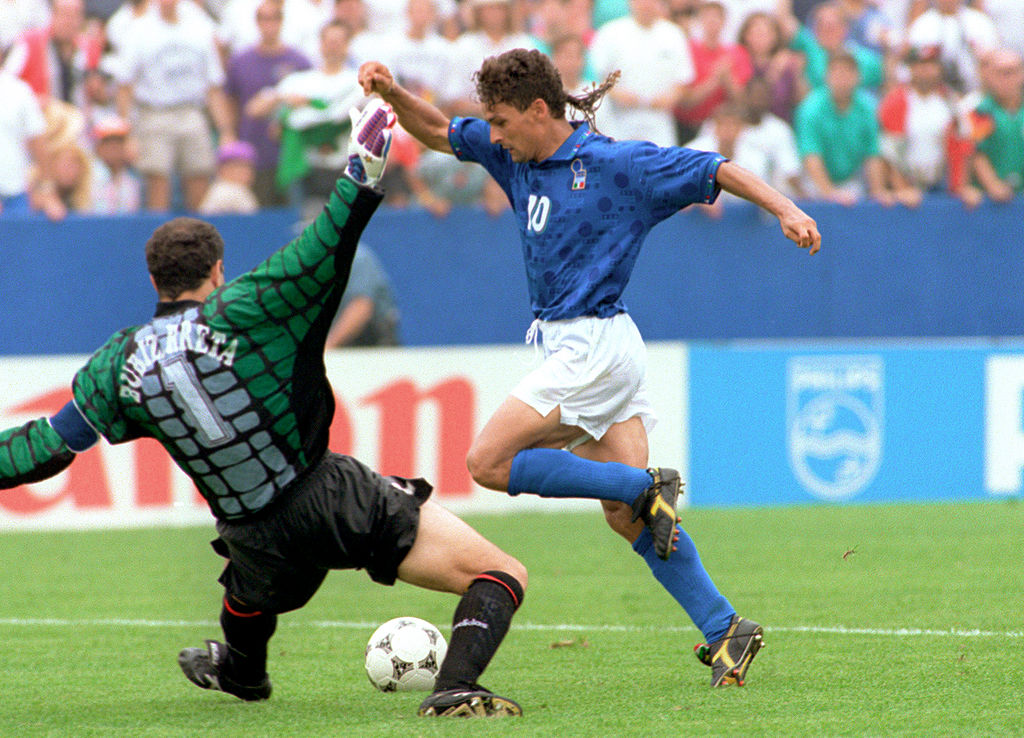




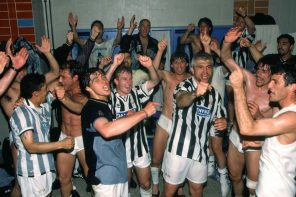
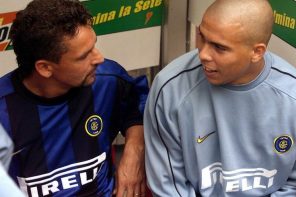
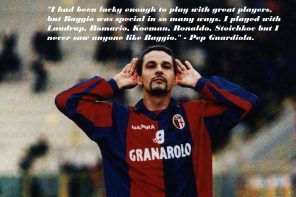
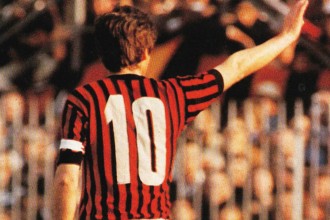
Roberto Baggio – Il mito del calcio.
Grazie di tutto Baggio!
vv
Roberto Baggio um verdadeiro fantasista.
Grazie di tutto Baggio!